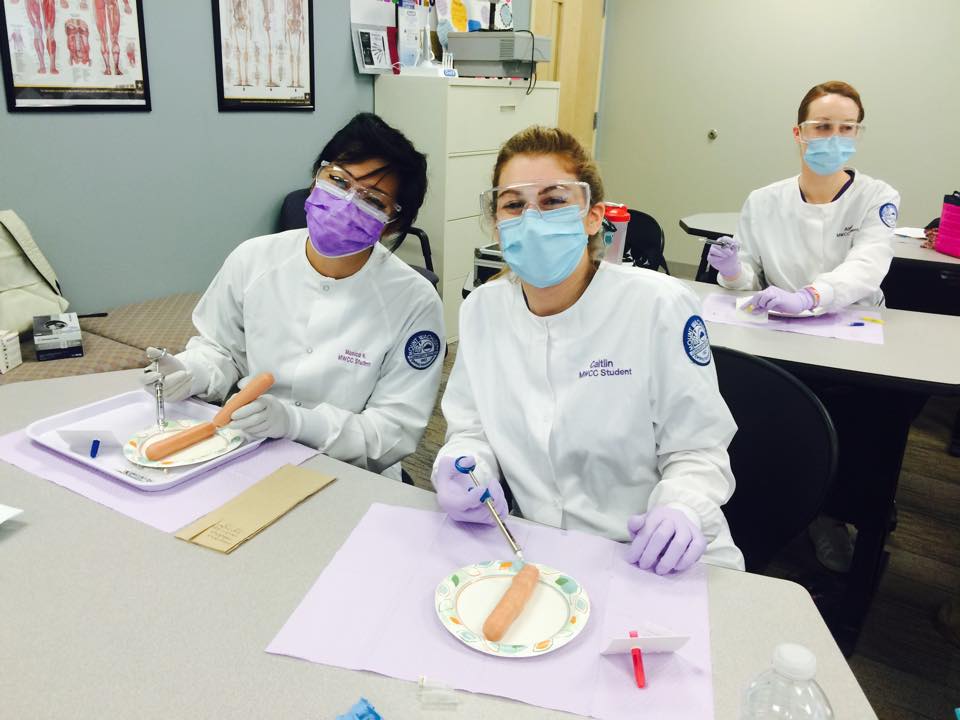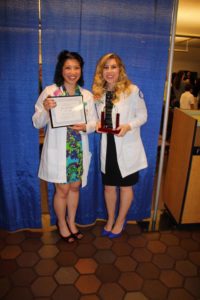There’s a well-known Mark Twain quote: “Find a job you enjoy doing and you will never have to work a day in your life.” Dental hygienist Monica Kwan loves that she has such a career. Not only is she able to work in a field she enjoys, but she can give back to the community. Monica shares her story of how she started in the dentistry field so that students can learn from her professional experiences.

ExploreHealthCareers.org (EHC): Why did you choose to work in health care?
Monica Kwan (MK): At the beginning of my academic career, I struggled with what career path I wanted to go down. Since there are so many fascinating professions, it was difficult for me to choose one realm. My family encouraged me to choose the medical field since I’m drawn to helping others. There’s also a demand for professionals in the health care industry, so I explored that option.
EHC: What inspired you to become a dental hygienist?
MK: My aunt works as a dental hygienist and I like that she can relate to people from all walks of life during her day. She offers a service that truly makes a difference in someone’s life. I hadn’t considered becoming a dental hygienist before, but things clicked when I shadowed her.
I also love that I’m a prevention specialist. Dental hygiene is one of the only professions that focus on preventing health concerns as opposed to treating them as they occur. The mouth is the portal to the rest of the body and reflects the state of our health and overall life quality.
EHC: Tell us about your professional experience.
MK: I’ve been working as a full-time dental hygienist in Hudson, MA for two years. I started as a dental assistant working under a general dentist and a periodontist, a dentist with advanced training in the structures which support the teeth and the diseases and/or conditions which affect them. I’d often assist the periodontist with surgical procedures, expanding my knowledge and allowing me to see them firsthand. I worked part-time as a dental hygienist at the same office and later was offered the full-time position. I’m more aware of what types of information are pertinent to the dentist and how it relates to the patient’s care as a whole. I also use my experience with anxious patients to my advantage to try soothing other patients who may have similar questions or concerns.
EHC: Where did you take classes? What does your schedule look like?
 MK: I took my dental assisting and dental hygiene classes at Mount Wachusett Community College. It may be a two-year program, but it takes about two years to complete the pre-requisite courses prior to admission into the program. Once accepted into the program, there’s a rigid full-time course schedule. It’s difficult to find much free time during the program’s two-year span, so time management is key. You spend a significant amount of time on campus in the classroom and in the clinic, typically with the same group of people. You become familiar with your classmates and your professors.
MK: I took my dental assisting and dental hygiene classes at Mount Wachusett Community College. It may be a two-year program, but it takes about two years to complete the pre-requisite courses prior to admission into the program. Once accepted into the program, there’s a rigid full-time course schedule. It’s difficult to find much free time during the program’s two-year span, so time management is key. You spend a significant amount of time on campus in the classroom and in the clinic, typically with the same group of people. You become familiar with your classmates and your professors.
EHC: What do your day-to-day tasks look like?
MK: Each morning, I review my schedule and prepare for each patient. During the appointment, I go over the patient’s medical history and determine if it’s safe to deliver dental treatment. I’ll then expose dental radiographs if it’s appropriate. I examine inside the mouth and around the head and neck for suspicious lesions or abnormalities and bring them to the dentist’s attention during their examination. I look for areas of tooth decay and abnormal or cancerous lesions. After my examination, I remove plaque, tartar (calculus) deposits and staining from the teeth. I educate patients on how to improve their oral health, offer nutritional counseling as needed and demonstrate how to use different tools like dental floss to meet this goal.
In my office, teamwork is stressed between the dentists, administrative staff and clinical staff. If there’s a break in my schedule I may assist the general dentist and the periodontist. This allows me to continue to learn about the realm of dentistry. I also assist in non-hands on duties such as instrument processing and sterilization, making/confirming appointments and housekeeping duties.
EHC: Do you have any tips for students interested in going into dental hygiene?
MK: Dental hygiene programs are selective, making it hard to get accepted into a program the first time around. There are a great number of qualified applicants who want to start the program right away. When applying to a dental hygiene program, your application needs to stand out.
Talk to your advisor to prepare for your journey through the pre-requisite courses. There’s a required number of science-related courses such as microbiology and anatomy and physiology. If you demonstrate that you’re capable of doing well in these types of courses, the admission committee will recognize your abilities to succeed in the program. It’s wise to try completing non-degree courses prior to admission into the program since dental hygiene courses are demanding.
 I often mention how my experience as a dental assistant served to be helpful for my career as a dental hygienist. It’s helpful to have background information and a basic understanding of dental theories and anatomy. Some of my peers state that they’ve experienced it in the medical field as EMTs, pharmacy technicians or nursing assistants. It isn’t the only necessary component to becoming successful, but it can help with comprehension since dental hygiene courses move fast. Some admissions committees may prefer students with a medical background, thus improving your chances.
I often mention how my experience as a dental assistant served to be helpful for my career as a dental hygienist. It’s helpful to have background information and a basic understanding of dental theories and anatomy. Some of my peers state that they’ve experienced it in the medical field as EMTs, pharmacy technicians or nursing assistants. It isn’t the only necessary component to becoming successful, but it can help with comprehension since dental hygiene courses move fast. Some admissions committees may prefer students with a medical background, thus improving your chances.
EHC: What do you wish you knew before you chose to study this field? Did anything surprise you about it after you started classes?
MK: Completing the program was a lot of work. When you’re in the swing of your classes, you realize that the course load can be stressful. There needs to be a passion for the subject matter and an understanding that your life will be devoted to classes for the next two years.
EHC: Are there any classes, programs, or activities that aren’t directly related to dentistry that has helped you succeed?
MK: Volunteering is a great way to succeed in health care. I’ve volunteered in free clinic settings as well as non-dental initiatives like homeless shelters. Volunteering humbles me, serving as a reminder that we are all on this planet and doing our best. It gives me the opportunity to learn about different cultures by talking to people in various aspects of life.
What continuing education or certifications are you looking to complete in the upcoming years?
MK: After graduating with my Associate’s in Science in Dental Hygiene in 2016, I took a year-long hiatus from academia and began working right away. Currently, I’m working on completing my bachelor’s degree in dental hygiene through an online program offered through Minnesota State University, Mankato. I began pursuing my bachelor’s in fall 2017 and I can complete all of my work online. It’s convenient to have the option to work toward your degree anywhere that has internet access. I was even working on assignments while I traveled through Ireland for my cousin’s wedding!
The next step is advancing my degree, so I can explore more options in the field outside of clinical practice. I like the program because you’re able to select courses and take them at your own pace. I’m looking forward to completing the program by the end of this year.
Are there any specific blogs that you follow, professional associations that you suggest students join or magazines to which you subscribe?
MK: I’m involved with the American Dental Hygienists’ Association (ADHA), an organization founded by members of my profession who aim to promote education and career development. Though membership is optional, I feel that belonging to an organization can be beneficial. Membership funds initiatives which enhance the profession and propel it forward. Members can also enjoy a subscription to Access magazine, which highlights cutting-edge projects and events occurring in the field.
The ADHA can also make dreams come true for dental hygienists. In June 2018, I was selected to attend the ADHA’s Annual Conference in Columbus, OH as a student liaison delegate. I learned so much about my profession and the hard work which goes into propelling it forward, an experience I’ve only dreamed of previously. It’s empowering to be surrounded by a group of passionate dental hygienists, who share my love and dedication to the profession.
Interested in learning more about dentistry? Check out more career profiles here.
